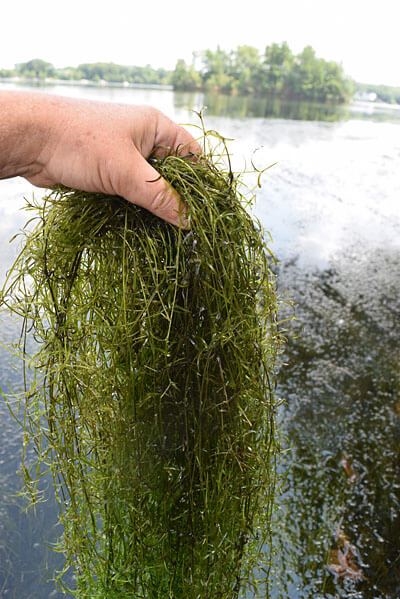Over the last two decades or so, weeds have become a very common endemic problem throughout ponds and lakes in the northeast. Fortunately, there are several models of success in removing or minimizing them, and multiple companies specialize in addressing these problems. Primary removal methods are typically mechanical in nature (hand removal, using specialized machines, etc.) or chemical in nature. None of these methods are inexpensive, and none of them happen overnight. Long term success also involves homeowner and community involvement and diligence in reducing manmade runoff into water bodies from fertilizers and the like.
At Willett Pond, we saw an explosion of weeds develop in late 2017, and swimming and even boating became difficult and unpleasant. Beginning that fall and carrying through early the next spring in 2018, our Board of Directors conducted numerous tests and began conversations with numerous weed experts and the conservation commissions of our three bordering towns to examine possible solutions. The Board then chose Solitude, a leading New England pond and lake weed treatment firm, to undertake a chemical treatment program in early summer of 2018.
This was not inexpensive with a first-year one-time treatment cost of over $40,000 (which was equally borne by over 2/3 of our abutters, a terrific community response), but the results were exactly as we had hoped: we successfully eradicated over 90% of the non-native and invasive weed species that had caused the vast majority of the problem. As part and parcel of this solution, we are now committed to yearly treatments for a somewhat modest annual fee. We are delighted to have successfully solved this important problem.
It is important to note that we live on a pond with a natural wildlife setting, and this pond has never been and will never become a part-time back-yard swimming pool complete with chlorine and absent fish, wildlife, and the native organisms supporting our shared existence. The chemicals we have used, principally Sonar and a smaller amount of Diquat, are designed to eliminate non-native invasive weeds like Eurasian, Milford, Bushy Pond Weed, and others, but not cattails, water lilies, certain algae forms, and the many other living native low-impact organisms that support fish and the many species of wildlife that make Willett Pond so special. It’s precisely this balance of use versus nature that makes our pond the beautiful place to live that it is!
Lastly, we work to try to continuously educate our abutter homeowners and other users about limiting the use of fertilizers and pesticides as well as preventing the introduction of aquatic invasive species (AIS) to ensure that we all work together to preserve our precious ecosystem for future generations.
We must also remember that we do not own the pond– NRLHA does, and any continued solutions to manage the ecosystem has to effectively go through them. We will keep you apprised as we evaluate future needs and options.

Bushy Pond Weed



